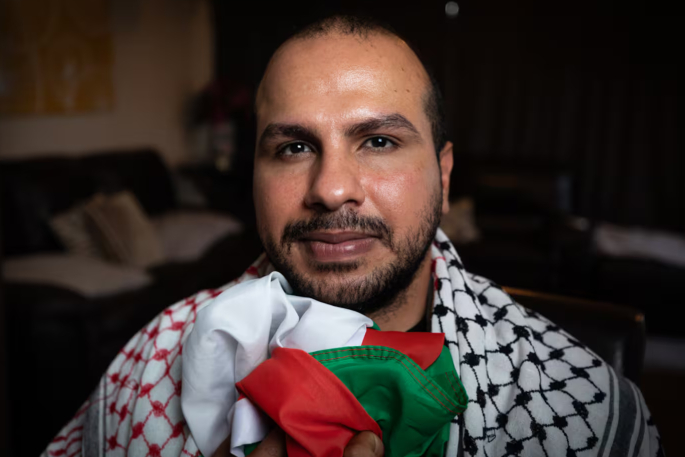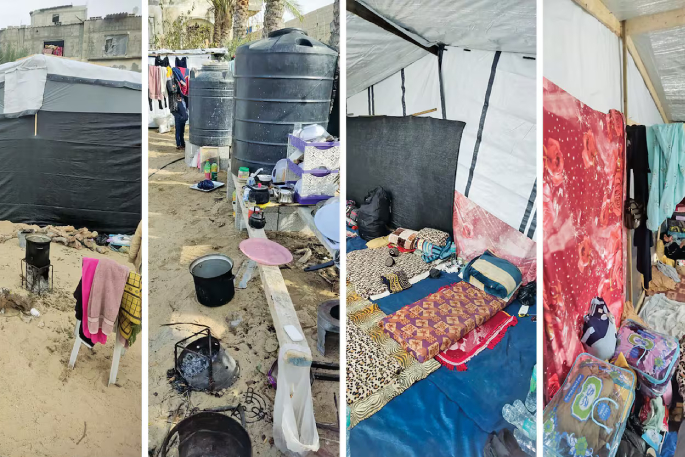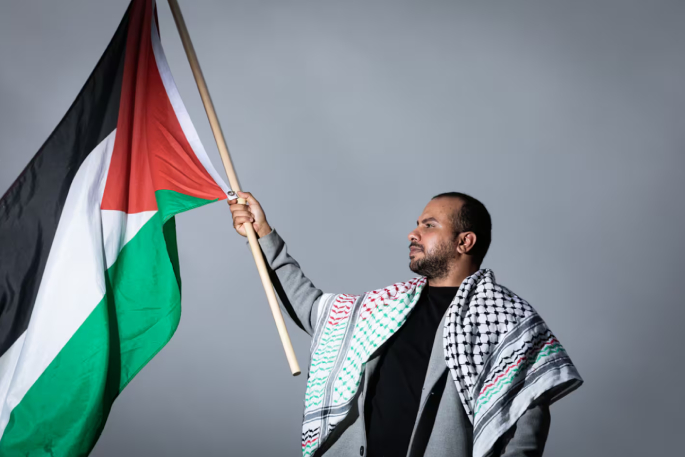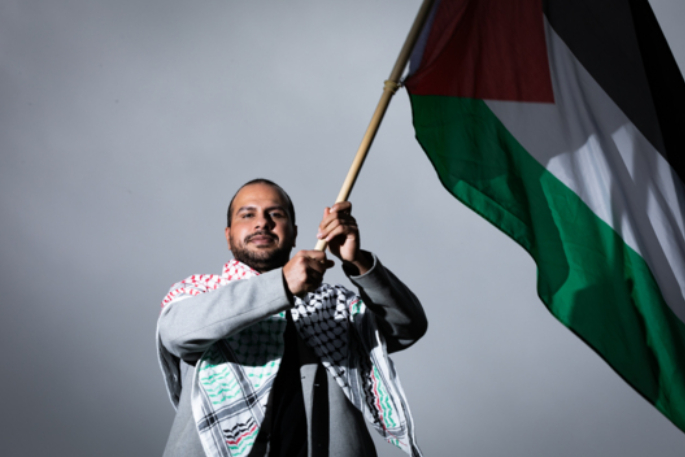“I could lose them right now while we’re talking.”
Maher Azzam is speaking about his family in Gaza, who are in constant danger due to the ongoing war.
The Palestinian national and Tauranga law student is desperate to get his family out of the war-torn area and to safety. He is calling on Immigration New Zealand to create special category visas, like it did for those fleeing the war in Ukraine.
Maher grew up in Gaza and moved to New Zealand just over a year ago to be with his wife Tessa.
He was in New Zealand when the conflict began on October 7 after Hamas militants fired thousands of rockets and sent dozens of fighters into Israeli towns near the Gaza Strip in an unprecedented surprise early-morning attack.
Since then, ground fighting and aid restrictions have claimed the lives of about 35,000 Palestinians, mostly women and children.
Before the conflict, 42 members of Maher’s immediate and extended family, including children, had shared a large three-storey home Al-Nasr, in Gaza’s northwest, but were now living in tents.
Maher says his family were among the 360,000 Palestinians recently driven from the southern Gaza city of Rafah by escalating Israeli military operations.
They had moved to the area after their hometown was levelled by constant bombardment.
 Maher Azzam is trying to get his family out of war-torn Gaza. Photo / Alex Cairns.
Maher Azzam is trying to get his family out of war-torn Gaza. Photo / Alex Cairns.
“They had to move again, half were in Rafah, and they joined the other half in Khan Yunis [a city in the southern Gaza Strip] last week.”
Maher says he had to take a break from his job as a junior criminal defence lawyer in Tauranga due to the stress he was under and the constant worry about his family.
“I could lose them right now while we’re talking,” Maher told the Bay of Plenty Times.
Maher set up a Givealittle page to raise money to evacuate his parents from Rafah.
More than $20,000 has been donated so far but “no one can get in or out of Rafah right now”, he says.
Maher was waiting for an indication from Immigration New Zealand that special category visas, like the exemptions made for those impacted by Russia’s invasion of Ukraine, would be granted.
Some of his family did not have passports or the documentation required to get one.
For Maher, the decision to grant special category visas came down to a “moral principle”.
People For Palestine claims there is a “double standard” when it comes to humanitarian protection.
The group says current Immigration Minister Erica Stanford, while in Opposition, urged the then Labour Government to create special category visas for immediate family members of Ukrainians who have settled in New Zealand.
Spokeswoman Bronwyn Cotter says “we ask her [Erica] and her National Party base on what basis has this not been done for the families of Kiwi Palestinians?”
In response, Erica says if someone was granted a visa, for example by Egypt, to enter their country they could receive consular support to get the correct documentation.
 After all living in the same home in Al Nasser for more than 30 years, the family of 42 have moved into two tents in Khan Yunis after being forced to evacuate Rafah early last week. Photo / Supplied.
After all living in the same home in Al Nasser for more than 30 years, the family of 42 have moved into two tents in Khan Yunis after being forced to evacuate Rafah early last week. Photo / Supplied.
However, the majority of people in Gaza could not leave because Palestine’s borders were “effectively closed”.
Immigration NZ was prioritising visa requests for Palestinians, but it was Israel and Egypt that granted visas for people to leave Palestine, Erica says.
“While there is no special visa for Palestinians, New Zealanders with family in Gaza can apply for a visitor visa for them.
“We encourage people who have family in Gaza to contact Immigration New Zealand about a visitor visa.”
Former Labour Party Minister for Disarmament and Arms Control Phil Twyford says a special Gaza visa should be created and diplomats should make every effort to get people out.
“Gaza is a living hell right now because of the Israeli onslaught. Kiwis with families trapped in the war zone are distraught, and many have already had family members killed by Israel’s military action.”
Associate Minister of Foreign Affairs Todd McClay recently acknowledged: “It’s a very concerning challenge in the Middle East and it’s something that I know many New Zealanders feel quite strongly about.”
Maher says if it were not for his Kiwi wife and her family, he would have returned to Gaza.
He says that in 2008, his older brother was injured by a bomb while travelling in a school bus and still lives with those injuries to this day.
“He is being displaced again, there’s nowhere safe in Gaza, no shelter,” Maher says.
Palestinians just “want to go home”, he says.
 Maher Azzam is desperate to get visas for his family. Photo / Alex Cairns.
Maher Azzam is desperate to get visas for his family. Photo / Alex Cairns.
“We want to live in Palestine and when this is over that is what you’ll see, people returning home to rebuild their homes.
“That is the resilience of Palestinians,” he says.
Maher says he grew up collecting footage of drone attacks in Gaza and dreamed of one day being a humanitarian worker for the UN Security Council.
He also represented Palestine in the Model United Nations as a 15-year-old, participating in delegation simulations and dreamed one day of taking a seat at the UN.
But since the conflict started, his only dream is that New Zealand creates special category visas which he hopes will allow him to get his family to safety.
Change on immigration settings a decision for Cabinet
People for Palestine advocate Olivia Coote says the organisation had been working with Auckland man Nehad Albattniji to help bring his six surviving members from Egypt to New Zealand.
Nehad, a New Zealand citizen, told 1News in March that he had lost 77 members of his family in Gaza.
Olivia says their visa applications were declined this week.
She says it was frustrating because people who had family in Gaza were being encouraged to contact Immigration NZ about a visitor visa.
“What has been happening is that of course, there are a lot of people who do not have documents or access to their documents or their passports have been destroyed.
“So those people are in a very difficult situation, which is why, you know, special humanitarian visas that have different conditions would be optimal for the situation,” Olivia says.
Erica says the humanitarian situation in Gaza was heartbreaking.
“The decision on the application for this family was an operational decision by Immigration New Zealand and I am unable to comment on individual cases.”
Erica says any change to the Government’s position on immigration settings was a decision for Cabinet “and needs to be considered in the context of our broader response which is led by the Ministry of Foreign Affairs and Trade”.
“All decisions of this nature are context-dependent. In light of the evolving situation in Gaza, I provided an update to Cabinet recently on visa applications from Gaza and sought their views.
“Following that discussion, the current settings have been retained,” Erica says.
Applications for visitor visas for immediate family members of Palestinian New Zealanders would be prioritised, Erica says.
Aleyna Martinez is a multimedia journalist based in the Bay of Plenty.
-Aleyna Martinez, Bay of Plenty Times



1 comment
Hmmm
Posted on 23-05-2024 12:23 | By Let's get real
Without suggesting for one moment that there would be a single representative case amongst genuine refugees, I cannot help but believe that terrorist organisations would not exist without vast amounts of support.
Is it not a reasonable question to ask why Egypt has not established a refugee camp within its desert border. Why are they frightened and why would the stronger power need to engage in precision attacks within an area containing refugees.
We have absolutely no idea what ideological concepts are being fervently held by anyone in the country currently, but in the main they are kept in check.
Many terrorist organisations are funded by communities in other countries. Let's not become one of them.
Leave a Comment
You must be logged in to make a comment.